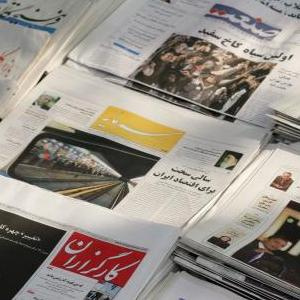Tehran’s Daily Newspaper Review

Poets were the guests of Ayatollah Khamenei last night. Iran’s Supreme Leader, known for his penchant for literature, praised the classical Iranian poems of such poets as Ferdowsi, Rumi and Hafez for the deep, complex notions manifested in their work. He also stated that the 1979 Islamic Revolution brought art to people’s lives. Iranian newspapers also commemorated the anniversary of the return to the country of the prisoners of the 8-year war with Iraq.
The new rate of “blood money” set by the Judiciary has raised concerns. According to Iran’s top headline, law experts have demanded a revision of the 90 thousand dollar rate, which will have profound economic and social implications. Iran also covered a statement released by 192 members of parliament in condemnation of its special edition on hejab. The signatories denounced the “non-expert, illogical, heterodoxical and offensive remarks on hejab, decency, and marriage, and for the paper casting doubt on the police forces’ legal efforts.” Minister of Transportation Ali Nikzad wrote Iran’s editorial today, elaborating on the significance of transportation infrastructures for the country’s economy and praising post-Revolution achievements.
Jomhouri-ye Eslami’s top headline was out of place, reporting the disclosure by lawyers of the horrid state of Palestinians in Israel’s prisons. The newspaper also quoted from Ali Motahhari’s unprecedented interview with Fars News Agency, in which the high-profile Tehran MP stated that instead of unity among the Principlists –for the upcoming parliamentary elections- he prefers unity among the wise of the Nezam. Egypt’s new stipulations for resuming ties with Iran and MPs’ condemnation of Iran’s special edition also appeared on Jomhouri-ye Eslami’s front page.
“Turn the region’s Islamic Awakening to the mainstream discourse,” Kayhan quoted the Supreme Leader. The newspaper also reported that the Al-Khalifa monarchy in Bahrain has used poison gas to crack down on anti-government protestors. In its editorial, Kayhan criticized the media for blowing out of proportion the significance of the recent controversial crimes across the country (the stabbing of “Iran’s most powerful man” and two clerics, collective rape of women in a city in central Iran, the murder of a young female student, etc.). While defending the Judiciary and police forces for their reaction to these events, Kayhan accused the media of merely thinking about their profit by focusing on such news.
Resalat quoted Secretary of the National Security Council Saeed Jalili, who after meeting his Russian counterpart Nikolai Patrushev stated that Russia’s proposal can serve as a basis for a pro-dialogue strategy. Jordanians said ‘no’ to King Abdullah’s cosmetic reforms, according to Resalat, while head of the Chamber of Commerce Mohammad Nahavandian called for the government’s cooperation so that the private sector could neutralize the sanctions imposed on Iran. In the newspaper’s editorial, Mohamamd-Mahdi Ansari reminded readers of Ayatollah Khamenei’s speech last week to senior officials to remind the elite of the Nezam that they and not the doctrine behind the Islamic Republic are responsible for any defects.
Minister of Finance Shamsoddin Hosseini announced the government’s 60 billion dollar revenue gained from implementing the Purposeful Subsidies plan, of which 26 billion dollars have been transferred to citizens’ accounts. Quoting the minister, Shargh also asked about the fate of the rest of the revenue, speculating (or suggesting) that only Majles’ investigation can answer this question. Shargh also quoted Foreign Ministry spokesman Ramin Mehmanparast who said that Iran has not yet received the details of Russia’s ‘step-by-step’ nuclear icebreaker. The editorial of the newspaper, “The 60 Billion Dollar Question”, was written by well-known Reformist economist Saeed Laylaz. The author doubted the statistics provided by the finance minister on the subsidy-cut revenue, arguing that contrary to his claims, no upsurge in economy has been witnessed within recent months.
Tehran-e Emrooz also cast doubt on Shamsoddin Hosseini’s report, stating that common speculation speaks of the 35 billion dollar revenue. The newspaper –which passionately supports the Principlists’ unity- interviewed a Principlist figure, Mojtaba Shakeri, who called on Principlists to follow the 7+8 mechanism to draw up a single slate for the parliamentary elections. “The British Confession” was the title of Tehran-e Emrooz’ editorial. The author attributed the “moral collapse” (David Cameron) of British society’s capitalist greed, liberalism and its abandonment of spirituality.
Vatan-e Emrooz preferred to focus on Britain’s problem with the banner headline “MI6 Special Mission”, that is, to identify and arrest protestors. “US’ bribe to Egypt’s liberals” to hinder the trial of Husni Mubarak was also covered by the newspaper. Vatan-e Emrooz also reported of the readiness of 74% of Iranians to defend their country by arms, according to a recent survey.
* Note: Vatan-e Emrooz does not publish on Thursdays.
Trouble with understanding some terms? Check our Glossary of Iranian Political Terms.
Briefing
Hamshahri (Citizen) is the official daily newspaper of Tehran's Municipality. Its general directions in politics, culture and economy are determined by the mayor of Tehran, currently Mohammad Baqer Qalibaf.
Iran is the official organ of the administration.
Jomhouri-ye Eslami (The Islamic Republic) was known as the official organ of the Party of the Islamic Republic, founded in 1979 and disbanded in 1987. Currently, it is an open critique of Mahmoud Ahmadinejad's policies and is known to be a mouthpiece of Akbar Hashemi Rafsanjani.
Kayhan (Universe) is a hard-line conservative newspaper. Its editor-in-chief –currently Hossein Shari’atmadari- is appointed by Iran's Supreme Leader. Shari’atmadari’s editorials often spark off controversy and debate inside Iranian political circles.
Resalat (Mission) belongs to the moderate wing of the principlist camp. Resalat’s best known analyst is Amir Mohebbian, its political editor.
Shargh (East) is a moderate reformist newspaper. It was the most popular and influential reformist newspaper in its first period of publication which lasted from August 2003 until September 2006.
Tehran-e Emrooz (Tehran Today) is a ‘principlist reformist’ newspaper, connected to Mohammad Baqer Qalibaf.

